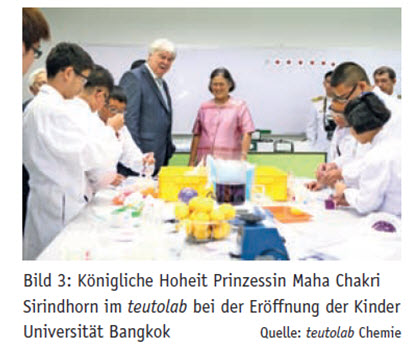มหาวิทยาลัยเด็กประเทศไทย เครือข่ายมหาวิทยาลัยศรีนครินทรวิโรฒ สร้างแรงบันดาลใจด้านวิทยาศาสตร์แก่เยาวชนท้องถิ่น
Main Article Content
Abstract
Surasak Laloknam
รับบทความ: 8 เมษายน 2557; ยอมรับตีพิมพ์: 30 พฤษภาคม 2557
บทคัดย่อ
โครงการมหาวิทยาลัยเด็กจัดตั้งขึ้นในปี พ.ศ. 2547 ณ ห้องปฏิบัติการทอยโทแลป มหาวิทยาลัยบีเลเฟล สหพันธ์สาธารณรัฐเยอรมนี เพื่อส่งเสริมให้นักเรียนระดับชั้นประถมศึกษาถึงมัธยมศึกษาตอนต้นได้ร่วมทำกิจกรรมการเรียนรู้วิทยาศาสตร์ที่หลากหลาย โดยมีผู้เชี่ยวชาญ นักวิจัย และพี่เลี้ยงนักศึกษาระดับปริญญาตรี โท และเอก คอยดูแลให้คำแนะนำในการทำกิจกรรมวิทยาศาสตร์และเทคโนโลยี พบว่า การดำเนินการดังกล่าวส่งเสริมให้เด็กและเยาวชนได้รับแรงบันดาลใจ และมีทัศนคติที่ดีต่อวิทยาศาสตร์ ทำให้มีการขยายผลไปยังประเทศต่าง ๆ ได้แก่ สาธารณรัฐประชาชนจีน และสาธารณรัฐอาหรับอียิปต์ ด้วยความร่วมมือของหน่วยงานต่าง ๆ ในประเทศไทย ได้แก่ สถาบันส่งเสริมการสอนวิทยาศาสตร์และเทคโนโลยี (สสวท.) สำนักงานพัฒนาวิทยาศาสตร์และเทคโนโลยีแห่งชาติ (สวทช.) ร่วมกับสำนักงานคณะกรรมการการศึกษาขั้นพื้นฐาน (สพฐ.) มหาวิทยาลัยเครือข่าย และองค์กรความร่วมมือแลกเปลี่ยนทางวิชาการแห่งสหพันธรัฐเยอรมนี (DAAD) จัดทำโครงการนำร่องมหาวิทยาลัยเด็ก ประเทศไทยขึ้นในปี พ.ศ. 2554 เพื่อวางรากฐานที่ดีให้นักเรียนไทยได้ฝึกฝนกระบวนการทางวิทยาศาสตร์ผ่านกิจกรรมลงมือทดลองที่ท้าทายและน่าสนใจ โดยมีผู้เชี่ยวชาญให้คำแนะนำ ตลอดจนเป็นการเตรียมความพร้อมให้นักเรียนเหล่านี้เติบโตไปเป็นนักวิทยาศาสตร์ วิศวกร หรือบุคลากรที่มีจิตวิทยาศาสตร์ มีความรู้ทางวิทยาศาสตร์ที่จะขับเคลื่อนเศรษฐกิจและสังคมไทยให้เจริญก้าว-หน้าต่อไป ด้วยมหาวิทยาลัยศรีนครินทรวิโรฒเป็นมหาวิทยาลัยเครือข่ายของมหาวิทยาลัยเด็ก ประเทศไทย ได้มีการดำเนินการจัดกิจกรรมส่งเสริมทักษะกระบวนการทางวิทยาศาสตร์ โดยจัดเป็นกิจกรรมค่ายที่ได้มาจากการพัฒนาผลงานวิจัย และบูรณาการร่วมกับการเรียนการสอนและการวิจัย รวมถึงทำกิจกรรมนำร่องตามความร่วมมือกับ DAAD ได้แก่ ค่ายเยาวชนรักษ์น้ำท้องถิ่น จำนวน 3 ครั้ง และค่ายเยาวชนรักวิทยาศาสตร์ จำนวน 3 ครั้ง จากการดำเนินการทั้ง 6 ครั้ง พบว่า กิจกรรมช่วยทำให้นักเรียนที่เข้าร่วมโครงการมีความสามารถทางทักษะกระบวนการทางวิทยาศาสตร์สูงขึ้น และสามารถเชื่อมโยงวิทยาศาสตร์นำไปใช้ในชีวิตประจำวันได้ ดังนั้นโครงการมหาวิทยาลัยเด็กที่มหาวิทยาลัยศรีนครินทรวิโรฒดำเนินการนั้น จึงเป็นการจัดกิจกรรมเพื่อต้นแบบการพัฒนาทักษะกระบวนการทางวิทยาศาสตร์ของนักเรียนได้
คำสำคัญ: มหาวิทยาลัยเด็ก ทักษะกระบวนการทางวิทยาศาสตร์ ค่ายเยาวชนรักษ์น้ำท้องถิ่น ค่ายเยาวชนรักษ์วิทยาศาสตร์
Abstract
The Children’s University (CU) project was established in 2004 at Teutolab, Bielefeld University, Federal Republic of Germany. The CU aimed to encourage primary and secondary students to have participations in various science learning activities. The experts, researchers, mentors, undergraduates, Master’s and Doctoral graduates have advised the science and technology activities. The finding showed that the promotion to students and youths to have the inspiration and positive attitudes towards sciences, following the expansion to other countries including the Republic of China and the Republic of Egypt. In Thailand, the Consortium of the Institute for the Promotion of Teaching Science and Technology (TPST), the National Science and Technology Development Agency (NSTDA) and the Office of Basic Education Commission (OBEC), University Network including Deutscher Akademischer Austausch Dienst (DAAD – English named German Academic Exchange Service Academic Exchange and Cooperation of the Federal Republic of Germany) had an authorized to set up the pilot CU in 2011. The CU has given the good foundations for Thai students to practice the science process skills through learning by doing the challenge and exciting experiments and any activities by using the guidance from the experts. In addition, the CU assists students to be good scientists, engineers or scientifically minded people who have the scientific knowledge to drive Thai economics and societies to progress growing development. Srinakharinwirot University (SWU), the one of university network of CU Thailand, has conducted the activities to promote the science process skills. The camp activities developed from the research findings integrated with teaching–learning and researching and included the pilot activity cooperation with DAAD. The activities composed of three Water Conversation Youth Camps and three Science Camps. The implement findings of 6 camp activities found that the activities can assist students, who attended in the camps, to increase their abilities of science process skills as well as connect science knowledge to their everyday life. Therefore, the SWU-CU Thailand can develop the prototype activities that are able to improve students’ science process skills.
Keywords: Children’s university, Science process skill, Water conservation youth camp, Science camp
Downloads
Article Details

This work is licensed under a Creative Commons Attribution-NonCommercial 4.0 International License.
References
ทิศนา แขมมณี. (2544). การพัฒนากระบวนการเรียนรู้ของโรงเรียน: การศึกษาพหุกรณี. กรุงเทพฯ: คณะครุศาสตร์ จุฬาลงกรณ์มหาวิทยาลัย.
วิมลรัตน์ สุนทรโรจน์. (2545). การพัฒนาการเรียนการสอน. มหาสารคาม: คณะศึกษาศาสตร์ มหาวิทยาลัยมหาสารคาม.
สมเกียรติ พรพิสุทธิมาศ. (2556). การจัดการเรียนรู้วิทยาศาสตร์ในศตวรรษที่ 21. วารสารหน่วยวิจัยวิทยาศาสตร์เทคโนโลยีและสิ่งแวดล้อมเพื่อการเรียนรู้ 4(1): 55-63.
สมเกียรติ พรพิสุทธิมาศ กุลชา ลี้ไพโรจน์กุล สุรศักดิ์ ละลอกน้ำ สุภาภรณ์ ศิริโสภณา สายสุณีย์ ลิ้มชูวงศ์ วัฒนีย์ โรจนสัมฤทธิ์ และธรรมศักดิ์ รินทะ. (2551). ผลกระทบของการเรียนรู้โดยใช้สมองเป็นฐานต่อพฤติกรรมการเรียนและผลสัมฤทธิ์ทางการเรียนรายวิชาชีววิทยาในระดับชั้นมัธยมศึกษาตอนปลาย. การสัมมนาวิทยาศาสตรศึกษาแห่งชาติครั้งที่ 3. โรงแรมโลตัสปางสวนแก้ว, เชียงใหม่.
สำนักงานพัฒนาวิทยาศาสตร์และเทคโนโลยีแห่งชาติ. (2555). โครงการมหาวิทยาลัยเด็กประเทศไทย. สืบค้นจาก http://www.nstda.or.th/news/9130-thailand-children-university เมื่อวันที่ 25 เมษายน 2557.
สุรศักดิ์ ละลอกน้ำ สุภาภรณ์ ศิริโสภณา สมเกียรติ พรพิ-สุทธิมาศ โพธิธรณ์ ครรชิตานุรักษ์ วิชิตพล มีแก้ว ชัยศาสตร์ คเชนทร์สุวรรณ และวันทนี ทาทอง. (2556). ความสำเร็จของการจัดโปรแกรมสิ่งแวดล้อมศึกษาในรูปแบบค่ายเยาวชนรักษ์น้ำท้องถิ่นสำหรับนักเรียนระดับชั้นมัธยมศึกษา. วารสารหน่วยวิจัยวิทยาศาสตร์เทคโนโลยีและสิ่งแวดล้อมเพื่อการเรียนรู้ 5(2): 165-175.
สุรศักดิ์ ละลอกน้ำ. (2556). เอกสารประกอบการสอนปฏิบัติการวิชาชีววิทยาสำหรับครูวิทยาศาสตร์ 1. กรุงเทพฯ: คณะวิทยาศาสตร์ มหาวิทยาลัยศรีนครินทรวิโรฒ.
อุดม เชยกีวงศ์. (2545). หลักสูตรท้องถิ่นยุทธศาสตร์การปฏิรูปการเรียนรู้. กรุงเทพฯ: โรงพิมพ์คุรุสภาลาดพร้าว.
Clough, M.P. (2002). Using the laboratory to enhance student learning. In Bybee, R. W. (Ed.), Learning science and the science of learning (pp. 85-87). Washington, DC: National Science Teachers Association.
Fensham, P.J., Gunstone, R. and White, R. (Eds.). (1994). The content of science: A constructivist approach to its teaching and learning. London: Falmer Press.
Laloknam, S., Sirisopana, S. and Phornphisutthimas, S. (2007). A simple detection of protease activity from fruits in undergraduate student. Proceedings of the ICASE Asian Symposium 2007. Welcome Jomtien Beach Hotel, Pattaya, Thailand.
Laloknam, S., Sirisopana, S. and Phornphisutthimas, S. (2010). Learning retention in undergraduate biology using a hands-on practical “Enzyme detection from vegetables and fruits”. Journal of Chemistry and Chemical Engineering 4: 29-35.
Teutolab. (2013). Teutolab international. Lela magazine. Augabe 7. November, 2013.
